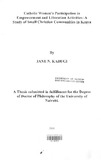| dc.description.abstract | This study is an attempt to investigate the Catholic women's
participation in empowerment and liberation activities in the Small
Christian Communities of the Catholic Church. It aims at investigating
how the SCC are avenues of liberation and empowerment for women at
the grassroots level. To articulate this, a comparative study of women
in urban and rural communities was conducted. It is the hope of this
study that such knowledge will be useful to theology of women
liberation and gender development.
The research was guided by the following objectives: To
investigate Agikuyu traditional concept of women; to assess the
Catholic women's participation in liberation and empowerment
activities in the SCC; to assess the role of the Beijing Conference
(1995) in the liberation and empowerment activities of the Catholic
women and finally to analyse the Catholic women's liberation activities
in view of Christology and Mariology as taught by the Roman Catholic
Church.The study was carried out in the Nairobi Deanery of the
Archdiocese of Nairobi and Kieni North Deanery of the Archdiocese of
Nyeri. The primary data was used to test the study's hypotheses: the
IX
Agikuyu tradition demean the status of women as second class; the
Catholic women in SCC participate in empowerment and liberation
activities; the outcome of the Beijing Conference has had both positive
and negative effects on Catholic women's liberation activities and
finally, the Roman Catholic Church's teachings on Christology and
Mariology conscientize the Catholic women on social praxis.
The study has seven chapters. Chapter one forms the
introduction and background to this study with the statement of the
problem, objectives, the rationale, scope, literature review, theoretical
framework, hypotheses and methodology applied to achieve its
objectives. Chapter two looks into the African traditional setup
surronding the socio-cultural, economic, religious, educational and
political circumstances surrounding the lives of women. For the
purpose of this study one ethnic group was identified as a representative
variable. This chapter forms an axis through which the Small Christian
Communities' participation in social praxis is discussed.Chapter three gives a historical overview of the Catholic Church
In Kenya to help the reader contextualise the study. Within this
perspective the status of women in the Catholic Church is handled. The
chapter goes further to discuss various forms of alienation facing
particularly the women. The question of women's Reproductive Health
issues are handled with special reference to family planning. This
forms the basis of Chapter four which looks into Catholic women's
liberation and empowerment activities through the Small Christian
communities.
Chapter five is a detailed analysis of different sources of
women's empowerement besides the social teachings of the Church.
The Catholic women, faced with cross cutting issues such as the
HIV/AIDS scourge, identify themselves with other women to fight such
diseases. The chapter looks at ways the Catholic women integrate
themselves in different development activities for survival.
Chapter six is an appraisal of the Catholic women's liberation
and empowerment acivities with reference to liberation Christology and
mariology. These are cardinal paradigms in liberation theology.
Chapter seven are the conclusions, findings and recommendations.Chapter six is an appraisal of the Catholic women's liberation
and empowerment acivities with reference to liberation Christology and
mariology. These are cardinal paradigms in liberation theology.
Chapter seven are the conclusions, findings and recommendations of
this study. This thesis has four main conclusions: The SCC are vital
organs of the local church through which the Catholic women
participate in empowerment and liberation activities. They are also
important in the social, economic and religious development of its
people. However, according to the primary data, this study concludes
that these communities are not exclusively Catholic communities.
People from different faiths such as Protestant churches were also
found to be members of the SCC due to their openness to other faiths in
their neighbourhood and concern for the less privileged. | en |

